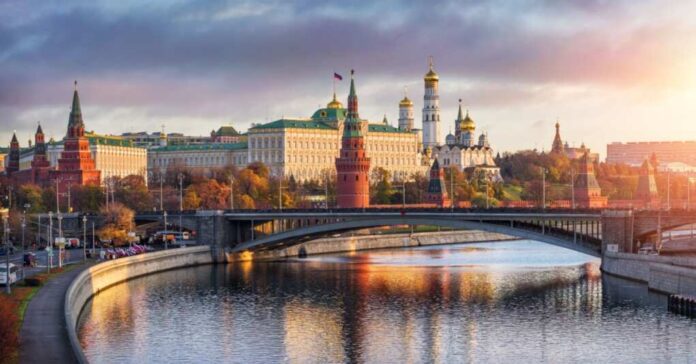Russian President Vladimir Putin has announced the arrest of all four gunmen involved in the tragic shooting that claimed the lives of 133 individuals at a concert hall near Moscow. He suggested that the perpetrators, intending to flee to Ukraine, were apprehended before crossing the border. Notably, Putin omitted any mention of the Islamic State’s claim of responsibility for the attack.
In his televised address, Putin insinuated, without concrete evidence, Ukrainian involvement in facilitating the terrorists’ escape. He implied that a passage had been prepared for them to cross into Ukraine. However, Putin stopped short of directly accusing Ukraine, stating that whoever was responsible, including those who might have dispatched the gunmen, would face consequences.
The gunmen, identified as foreign nationals, were among 11 individuals detained by Russian authorities following the attack. Islamic State, via a related news agency, asserted responsibility for the assault and claimed the attackers’ successful evasion. Despite this claim, Russian officials have remained reticent, while a US official affirmed intelligence corroborating the Islamic State’s involvement.
Predictably, Ukrainian President Volodymyr Zelenskiy condemned Putin’s attempt to shift blame, characterizing it as typical behavior from Putin and his ilk. The Ukrainian foreign ministry dismissed Russian accusations as an endeavor to stoke anti-Ukrainian sentiments.
Adding to the complexity, some Russian officials speculated on Ukrainian involvement, reminiscent of the full-scale invasion launched by Russia against Ukraine two years earlier. Alexey Chepa, the first deputy chair of the state Duma committee on international affairs, suggested a link between the events and Ukraine.
The death toll from the attack has risen to 133, with at least 145 individuals injured, including 16 in critical condition. The aftermath depicted scenes of horror and chaos, with graphic videos capturing the gunmen’s ruthless assault on innocent concertgoers.
In a heartening moment amidst the tragedy, an individual bravely intervened, thwarting one of the gunmen and potentially saving countless lives. The Russian investigative committee lauded this act of heroism.
Investigations revealed that the assailants employed both firearms and flammable substances, exacerbating the devastation. The international community swiftly condemned the attack, labeling it a cowardly act of terrorism.
This harrowing incident marks the deadliest attack in Russia since the 2004 Beslan school siege, underscoring the imperative for robust security measures. Questions arise regarding Putin’s response to prior terror warnings, especially given recent alerts issued by Western nations.
The group claiming responsibility, Islamic State Khorasan Province (ISKP), operates in Afghanistan and aims to establish a caliphate across several countries. Reports suggest that Russian security services had received intelligence from the US regarding a potential attack by ISKP, despite initial dismissal by Putin.
The spread of conspiracy theories has further exacerbated the tragic terror attacks in Moscow, adding another layer of distress to an already devastating situation. The involvement of ISIS-K, or Islamic State Khorasan Province, in the attacks contributes to the complexity and confusion surrounding the event. Unlike other terrorist groups, ISIS-K’s actions don’t neatly align with prevailing geopolitical narratives, complicating efforts to assign blame.
While it’s true that the group has targeted both Russia and the West, its motivations extend beyond conventional alliances. Instead of taking sides in existing conflicts, ISIS-K sees opportunities to exacerbate tensions between global powers, hoping to weaken all perceived enemies. This multifaceted approach leaves room for speculation and conspiracy theories to flourish. Moreover, recent events, such as German authorities arresting two Afghan ISIS supporters planning an attack in Sweden, further add to the uncertainty surrounding the group’s intentions.
The enigmatic nature of ISIS-K’s operations only adds fuel to the fire of conspiracy theories. The group’s propaganda welcomes conflicts like the war in Ukraine as part of a broader narrative of “crusader against crusader wars,” aiming to exploit chaos and instability to further its agenda. This stance diverges sharply from traditional geopolitical rivalries, making it difficult for observers to make sense of ISIS-K’s actions even when the group claims responsibility for attacks, as it did in Iran. Suspicions and blame-shifting persist, contributing to a sense of disorientation and distrust.
In ordinary circumstances, a terrorist attack on Russian soil would prompt swift and forceful retaliation from the Kremlin. However, the ongoing war in Ukraine has stretched Russia’s military and security resources thin, diverting attention away from external threats. This situation creates a precarious environment where the Kremlin’s response may not align with expectations. Instead of directly targeting the perpetrators, there’s a risk that the reaction could disproportionately affect Ukrainians and internal dissenters, further muddling the narrative surrounding the attacks.
In the wake of the attack, Russian authorities have conducted raids and interrogations, shedding light on the assailants’ backgrounds and potential motives. Analysts point to ISKP’s anti-Russia rhetoric and its broader agenda against nations involved in counterterrorism efforts.
Putin’s intervention in the Syrian civil war, supporting President Bashar al-Assad against opposition forces and IS, may have further fueled animosity from extremist groups. ISKP’s messaging aligns strategically with anti-Russian sentiments, adding layers to the complex geopolitical landscape.
As Russia grapples with the aftermath of this tragedy, it faces not only the immediate task of apprehending perpetrators but also the broader challenge of countering terrorist threats and safeguarding its citizens. The incident serves as a sobering reminder of the persistent threat posed by extremism and the imperative for international cooperation in combating terrorism.



















